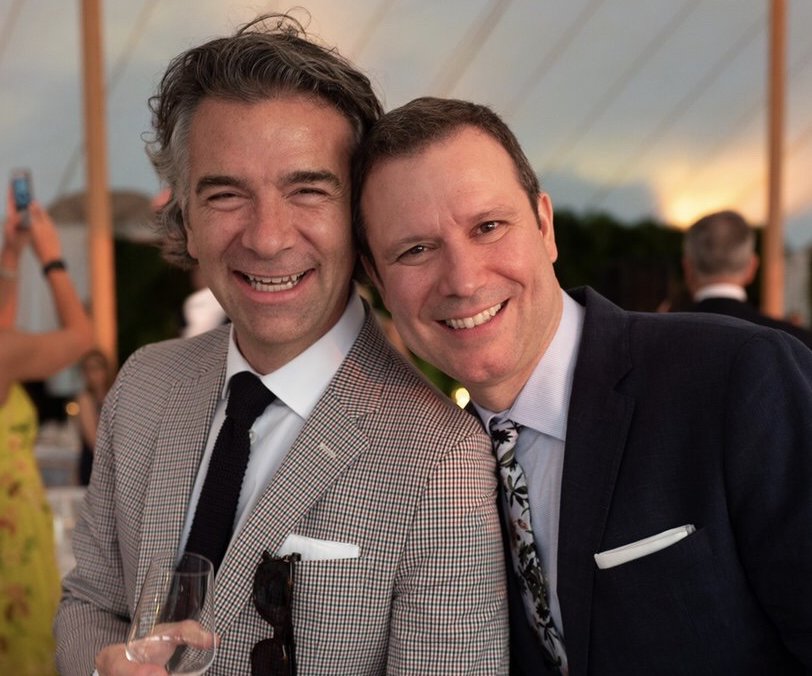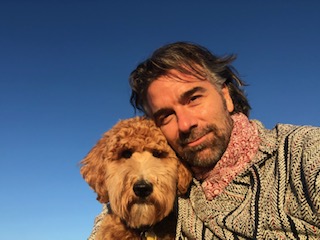Out East End: Private Chef & Estate Manager Rob Miketa

He’s cooked for Calvin Klein, Yoko Ono and Julian Schnabel. He’s trained at the Cordon Bleu in Paris, taught and cooked at two Michelin star restaurants and opened five restaurants in Manhattan, including the Tribeca Grand Hotel.
But it was one sentence from dinner guest Caroline Kennedy that chef Rob Miketa says is among his fondest memories in all of his years working as a private chef. It happened after she tasted his signature fregola with clams — a Sardinian dish consisting of “a fregola toasted kind of couscous type pasta with clams” that he says he learned while living in Tuscany.
As Miketa tells it, “I have cooked for a lot of celebrities, and that’s fine, my husband works for a lot of celebrities so I don’t get starstruck or whatever, but I really enjoyed cooking for Caroline, and one of the greatest things is that she came into the kitchen and she said, ‘Those are the best clams I have ever eaten.’”
The story gets better. When Kennedy followed up with Miketa via email, asking him if he knew someone who could cook for her, Miketa obliged, asking her what she was looking for in a chef. Her response floored him.
“She said, ‘I’d like a Rob clone,’” Miketa says with humble enthusiasm. “I was like, what a wonderful compliment, I was so touched. My food really means a lot to me and the fact that she would say that was like, wow … it really threw me off.”
Food has certainly been a major part of Miketa’s life, having grown up on a family farm in Pueblo, Colorado where he says he learned how to cook from both his Sicilian mother and grandmother and his Croatian father and grandfather.
“My grandfather was one of the first in the U.S. to cultivate yellow watermelons,” Miketa says proudly. “And one of the first in Colorado to grow organic beef.”
Becoming a chef was a childhood dream, Miketa says. “I was baking with my grandmothers all the Italian and Croatian pastries and our traditional foods from age 10.” At 15, Miketa’s doctor took him to a local country club in Colorado. “We were blessed to have two French chefs at the country club,” he recalls. “The doctor said, ‘Teach this boy a trade.’” And they did.
It was the start of a career in food that eventually (after graduating from Duquesne University in Pittsburgh) took him to Paris where he worked with the famous pastry chef Pierre Herme, which led to working in two Michelin star establishments, working for Terrance Brennan and running Picholine, and opening restaurants in Manhattan including Mare Mare, Hot Tomato, Washington Place and the Tribeca Grand Hotel. Miketa says he enjoyed lots of great press from Gael Greene, Florence Fabricant and New York magazine. And then 9/11 hit.
“As an executive chef, I opened five restaurants in Manhattan,” says Miketa. “It was 9/11 that sent me into the private world.”
He landed in the Hamptons as a private chef for the Wenner family of Rolling Stone magazine and worked for them for two and a half years. After that stint, he took a job as a private chef with a family in Water Mill that turned out to be the working relationship of a lifetime. Today, Miketa still cooks for that family for holidays and special weekends, but is now the family’s estate manager (managing several international residences for them).
We caught up with Miketa via phone where he lives in Washington Heights, NYC to learn more about his fascinating career (and where he likes to source his food locally).

What does it take to be a private chef?
You must leave your ego at the door. You are cooking for a family, you are not cooking for you — you are cooking for their tastes … and you need to be not only willing, but you have to be capable of doing a great party … and pretty much on your own. …
You really have to become a member of the family … food is all about nurturing and you really need to be able to feel comfortable with giving care and nurturing this family, as well as they need to be able to feel comfortable with receiving it from you.
It’s a very intimate relationship … any real fun time that you have begins and ends in the kitchen.
Do you have a greatest hits list in terms of what you whip up?
I do a rigatoni dish with fennel sausage and peas, and that’s a big favorite … the clams with the fregola, I do that a lot … brioche French toast in the morning … my grilled pizzas, rack of lamb — those get requested a lot.
You were once married to a woman. …
I came out when I was 30. I was married (to a woman) for four years, moved to New York right after I was married … then I got divorced … I had actually been engaged in college to this other girl and I thought, “Oh my God, I just married the wrong woman!” And so I immediately called her and we started trying to date — she lived in Pennsylvania so it was hard. And then I got picked up on a bus [laughs]. I have no idea what compelled me to get off the bus with this guy … we had a drink and then he kissed me and then it was like fireworks, and I thought, “Whoa, wait a minute, what is going on here?” That was my whole intro into being gay. I realized what was going on and a lot of therapy later. …
You are now married again. …
Yes, my husband’s name is Charlie. He works on Broadway, he’s a production stage manager and we’ve been together for 10 years, married for eight.
Do you plan your menus? Where do you source food?
I say, “What are you craving?” That’s my question … and they say “How about chicken, how about rack of lamb, steak.” … That’s all that’s said … unless they have a very specific request, I go to the farm Green Thumb in Water Mill — I love it there — and I see what looks good. If they say, “Let’s do some fish,” I’ll go out to Cor-J — I’ll go to Clamman and see what fish looks good, what’s swimming at the time … so there’s a trust factor there between the client and the chef that has to be there.
I do go to Citarella, of course, Peconic (Prime) Meats in Southampton is amazing … Amagansett Wine & Spirits, Steve, I rely on him greatly because you need to know what high-end wines are available — because we go through a lot of Chateau Latour where I work and there’s only so much Chateau Latour around, and you really have to be able to source it and trust that it’s real.
What about desserts?
I love pastries … strawberry shortcake … they love my key lime pie with a macadamia and coconut crust. I do a double chocolate tart with a little salted caramel, some praline pecans.
Last week, I got Charlie to help me with a Croatian bread named potica — it’s a Croatian nut roll that I learned when I was 10 — the dough is hand stretched very thinly across a table and coated with a cooked walnuts and honey spices and then that’s all spread out.
Making the potica every Easter is very important to the Croatians — you eat it every Easter morning with ham, spring onions, and then you have the egg knocking contest … it’s a heart-warming tradition.
It seems as though you have really followed your bliss.
I did. My food has taken me around the world. … Food is so important to me and it always has been. … Sometimes food is a lot of work, a lot of fuss, a lot of steps, but it’s important to do those things. That’s where the love is shown. It’s my love language. So when I cook, it’s me telling you,
“I love you.” (laughs)



